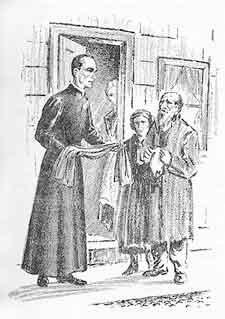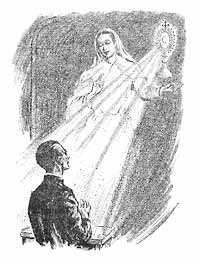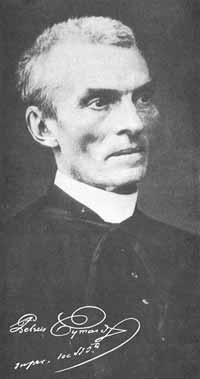Pierre
Julien was born on
Though the boy was baptized the next day with the names Pierre Julien, he was most often called Julien. He was a very good and pious boy, and he loved to go to church with his mother, on her daily visits to the Blessed Sacrament. When Julien was at the church, he was always quiet and prayerful. Later in life he said, "Even though I was a young child, I gained wonderful graces, each time I went to visit the Blessed Sacrament, with my good mother. Mothers, I beg you, please visit the Blessed Sacrament and bring your children with you, so that you can gain great graces for yourselves and your children!"
Julien was always attracted to the Blessed Sacrament. Sometimes, as a young boy, he would go to the church by himself, to visit the Blessed Sacrament. He would sit on a stool in front of the Tabernacle. One day somebody saw Julien sitting there and praying, while looking at the Tabernacle, "What are you doing here?"
"I am praying, he said. "I am closer to Jesus and I hear Him!"
Julien had an older sister named Marie-Anne, who used to receive Holy Communion quite often. One day he told her, "You are very happy to Communicate so often. Please receive once for me."
"What shall I ask for you?" his sister questioned.
"Ask," he replied, "that I may be very gentle, very temperate, very pure, and that one day I may be a priest!"
Julien went to Mass every day. After learning the prayers of the Mass, he served Mass, whenever he could. He would often go to visit the Blessed Sacrament with his friends. Several times a week he made the Stations of the Cross. The boy also loved to play being a priest, at his own hand made Altar.
Julien was quite intelligent and did very well in school. He was a great favourite of his teachers and his friends. He learned his Catechism so well, that after a while, his teacher did not even question him on it.
The boy was very pure and innocent. He loved his parents dearly and they in turn loved him, and thought he was a most wonderful son. Julien loved Marie-Anne, and she loved and admired him. She saw him very often during the first thirty years of his life. On one occasion Marie-Anne said, "I have never seen Julien purposely commit a venial sin, and I believe that he has remained pure since his Baptism." Many of his friends also said the same thing about Julien. They saw by his example that he was very pure and holy.
Julien prepared for his first Holy
Communion in a very special way. Even though it was winter, he went with
his bare feet to pray at a
|
Everything he had he gave to the poor. |
|
Julien got his strength from Holy Communion. During his teen-age years he needed extra strength, because for seven long years, the devil tempted him with evil thoughts. Julien prayed, "My God, rather cut off my arms and feet, cut off my head, but save me from sin!" He suffered terribly during this time of temptation, but he remained pure.
He was a very gentle soul and had great sympathy for people and animals. He was truly kind to the poor and would sometimes bring a poor soul home, in order to show him some kindness and charity.
Julien had a great love for Our Lady. He often prayed to Her and begged Her, to help him become a priest and missionary. When he was sixteen, he told his father that he wished to become a priest. His father was angry, "I don't like this foolish idea of yours. I want you to take over the family business, so you will be well off in the world. You can be sure, I will do nothing to help you get an education for the priesthood!"
But Julien was not discouraged. He bought a Latin grammar book and began to study it secretly. Also, some seminarians that learned about his sad situation, agreed to teach him. He secretly met them several miles from his home. Although Julien's father remained unhappy about his son's choice in life, his mother gave him much encouragement and prayers.
Julien got himself accepted for
free, at the
The boy's mother died on
About this time Fr. Guibert, an Oblate Missionary came to La Mure. Julien went to see him, "Father, I want so much to become a priest. I beg you, please ask my Papa to let me go with you, to become an Oblate!"
This time, Papa Eymard said that
Julien could go. Fifteen days later, Julien went to the Oblate novitiate
at
Julien's father died on
The young man completed his
studies, and was ordained on
In July, 1873, Fr. Eymard left Chatte, to become the curé at Monteynard. He had only eight cents to his name, because he had given all his belongings to the poor. Marie-Anne, was his housekeeper and very often Fr. Eymard had no money to give her for keeping house, because he had given it to the poor.
Fr. Eymard wanted to enter
a religious order of Marists. The Bishop did not allow him to go at first,
but finally he gave his permission. The holy priest entered the Marist
novitiate at
Later, Fr. Eymard was made
Provincial of the Society of Marists. He became even more humble and
gave himself completely to the good God.
On
|
It was at Our Lady's shrine in Fourvieres that Saint Peter Julian received the inspiration to found an order completely dedicated to the golary of the Holy Eucharist. |
|
During a retreat, on
On
From then on, Fr.
Eymard spent most of his time thinking about how to honour the Holy Eucharist.
But even before then, the idea was in his mind. When at Seyne, in 1845,
he gave much consideration to it, and after he had reorganized the college,
he set up the work of "Night Adoration for Men," like
the one, which had been set up, in
One day Fr. Eymard wrote a letter to his friend, the Captain of a ship, "I have often thought about how to stop Catholics from being so indifferent and cold towards God. I find that the one and only way is the Blessed Sacrament; loving Jesus in the Most Blessed Sacrament. The death of faith comes mostly from the loss of light, the icy cold of death comes from not having the fire of love in our souls!"
Fr. Eymard wanted to start an Order that would glorify the Blessed Sacrament in every way: by Adoration, Thanksgiving, Reparation and Petition. In 1854, Fr. Eymard wrote a letter to the Master General of the Dominican Order. This good Dominican presented the idea to Blessed Pope Pius IX who said, "It’s a beautiful thought which I will encourage, if I see that it is the Holy Will of God."
Fr. Eymard presented the
idea to Fr. Favre, the Superior General of the Marists. But the
In 1855, Fr. Eymard asked his old friend Fr. Touché, to speak to the Holy Father and show him the plans for the Order of the Holy Eucharist. When the Pope received the documents he said, "This work comes from God, I am convinced of it! The Church has need of it. Let every means be taken to make the Divine Eucharist known!"
When Fr. Favre was told what the Pope said, he still would not give his permission to Fr. Eymard, to go ahead with the new Order. Fr. Eymard believed that his idea of starting the Order, to honour the Blessed Sacrament, was God's Holy will. He got released from his vows as a Marist, and discussed his good work with many other priests and laymen. Among these was Captain de Cuers, who entered of Grand Seminary of Marseilles, France and was later ordained a priest.
On Ascension Day,
So the new society was born. Fr. Eymard wrote, "Our Lord Jesus Christ in His Divine Sacrament, is all the end of the Society of the Most Blessed Sacrament. To serve Him by the solemn worship of Adoration, to be devoted to His glory by the Eucharistic apostolate, that is all the life of a religious of the Most Blessed Sacrament."
The name given to the new Society was, "The Congregation of the Most Blessed Sacrament". It was to be made up of priests, clerics and lay brothers, living a life in common. They were to form a Eucharistic Guard of Honour, and to spend three hours of Adoration every day before the Blessed Sacrament, two hours by day and one by night. The priests were also to preach, hear confessions and study, but their main work before anything else, was to adore the Most Blessed Sacrament.
On June I, 1856, the two
priests, Fr. Eymard and Fr. De Cuers, moved into a house given to them
by the Archbishop of Paris. The house was opened with a procession of
the Blessed Sacrament. The two priests were very poor and did not have
the things necessary to keep house. They were poor in material goods,
but Fr. Eymard exclaimed, "We are rich with Our Lord!" But
poor as they were,
On
But again the Lord provided. On Easter Sunday, 1858, they moved into a new house. The Archbishop allowed them to have Perpetual Exposition of the Blessed Sacrament. This meant that the Most Blessed Sacrament would be exposed all day long and all night long, every day of the week! What a wonderful blessing for the new Congregation.
They remained in this house for nine years and during this time, things went from bad to worse. It was hard to get vocations. The few vocations they did get, did not last long because the postulants found that life in the Congregation, was too difficult. Even Fr. Eymard's best friends failed him. Finally, the heaviest Cross came, when Fr. de Cuers left the new Congregation because he also found, that life in the Order was much too difficult!
Poor Fr. Eymard was left all alone! But the saintly priest was not one to give up. He calmly put on his surplice and stole and exposed the Blessed Sacrament as usual. "You are in Your place Good Master," he said, "and I am in mine. It is for You to do the rest." His faith was rewarded. Inside of twenty-four hours, Fr. de Cuers, with new courage, came back to his usual place of adoration. Slowly but surely, the work went on.
When the Congregation was finally
going well, Fr. Eymard decided to establish a Society for women, as Our
Lady had asked of him, at Fourviere. He sent for Mlle. Guillot, her sister,
and another woman, asking them to come to
So the three ladies left for
When the Congregation
was finally going well, Fr. Eymard decided to establish a Society for
women, as Our Lady had asked of him, at Fourviere. He sent for Mlle.
Guillot, her sister, and another woman, asking them to come to
But Mlle. Guillot
would not go to
Two more women
came to join the group and in 1859, these five women made their first
vows. The Sisters were called, "The Servants of the Blessed Sacrament."
Their Order spread rapidly and in a short time, new convents were set
up in
|
|
|
As time went on, Fr. Eymard's health became worse. In February, 1868, at the age of fifty-seven, he got sick with the flu. His body was worn out, but he continued to preach. The good priest carried on with his work as long as he could, but as August approached, he was nearing his end. Shortly before his death, Fr. Eymard told one of his religious, "Whether I am here or not, what difference does it make? Have you not always the Eucharist?"
He returned
to La Mure, and his beloved sister, Marie-Anne, came to see her dying
brother. She watched at his bedside, as his life faded away. His voice
was weak as he looked up at Marie-Anne, "Adieu, sister, it is
ended!" These were his last words; he died on
Nine years
later, in 1877, the clergy decided to move Fr. Eymard's body to
Fr. Eymard
was made Blessed by Pius XI, on
Home | Contact
| Mass Centres | Schools
| Pilgrimages | Retreats
|
Precious Blood Residence
District Superior's
Ltrs | Superor General's
Ltrs | Various
Newsletter | Eucharistic
Crusade | Rosary Clarion | For
the Clergy | Coast to Coast |
Saints | Links


